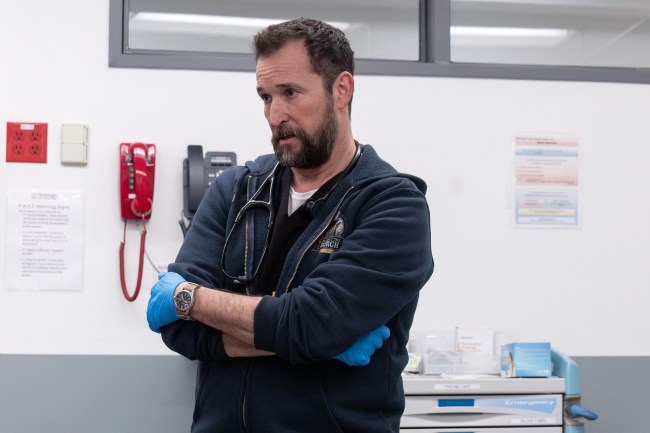David Zaslav is usually more wistful about the beauty and legacy of his company on his earnings calls than most CEOs, but this morning, he got a question about what makes HBO as a brand so unique and valuable in the event of the sale rumors — and the literal for sale sign — that Warner Bros. Discovery put up a few weeks ago.
The analyst teed him up, and Zas launched one out of the park with his praise for his own company.
“This team has been together for almost 15 or 20 years,” he said. “They love what they do, and they wake up every day and fight for the most compelling story, and people love to work with them, because there’s a shared passion. At HBO, when you’re working with Casey [Bloys] and Amy [Gravitt] and Franny [Orsi] and Sarah [Aubrey], when we get that series, we fight globally that everyone should see it and we believe in it, and this idea of community, of putting it on every Sunday night or Monday night or Thursday night, and having a real conversation about story. It feels old-fashioned, but it’s extremely powerful.”
We’ll give you a moment to wipe that tear out of your eye. But Zaslav isn’t wrong that there aren’t that many entertainment brands out there that, just by stamping their name on a project, it gives an added mark of prestige quality. He praised HBO further by saying it has never delivered a more consistent lineup of shows and documentaries that people regularly circle on their calendar as appointment television. It’s why a lot of us were dumbfounded when WBD decided to remove the HBO moniker from HBO Max — only to put it back a year later!
It’s also why one of the biggest questions, should Paramount (or whomever) wind up buying Warner Bros. Discovery, is: what happens to the streaming service, HBO Max, that houses all of that HBO content? Would Paramount really keep around two streaming services when it already has one of its own? Analysts have long said not every major streamer will be able to survive, and consolidation is just one way that can happen.
Zaslav, in the company’s earnings release, stressed that it would not have any new announcements or take any questions on a potential sale (he said, “It’s fair to say that we have an active process underway”), so this morning’s call was a letdown in that regard. But he did say that, when it comes to HBO Max, the streamer is well-positioned, regardless of what happens to the company.
Warner Bros. Discovery as part of its earnings today announced that it has 128 million global subscribers (WBD doesn’t break out subs for an individual service, so that’s inclusive of HBO, HBO Max, and Discovery+), an increase of about 3 million from the prior quarter. Zas also said he hopes to reach 150 million globally by next year. If they can do that, they can start really rolling in the Benjamins, because CFO Gunnar Wiedenfels said the company has shifted from an external to internal monetization of the company’s library — meaning they’re not licensing as much as they were and are mining other library content better, and it’s paying off.
In context of just how Warner Bros. Discovery was leveraging its deeper library of titles, streaming chief JB Perrette chimed in to explain that the way the rights are currently set up, even in the event Warner Bros., HBO, and HBO Max separate from Discovery and the cable channels, the streaming service will still have access to all those cable shows that they believe makes HBO Max worth the sticker price. Zaslav clarified “that will be the case even if in fact HBO Max goes ahead and splits as planned, if Warner is acquired as Warner, and if the company is acquired in whole, then they’ll have access to everything.”
That last bit is of course the key, that if someone else buys the company whole cloth, well they can do whatever they want with it and would have access to all the content as they see fit, and maybe that means getting rid of it altogether. But even if someone buys the more valuable studios side of the company with HBO Max in tow, it doesn’t mean HBO Max would suddenly lose all its HGTV or Food Network shows in addition to the HBO shows and WB films.
Part of the reason HBO Max is well positioned is that it’s still growing better than some of its competitors, and it’s doing it despite not really having the same breadth of sports or live content that others do. WBD is building its own standalone sports streamer and even taking another stab at a CNN standalone app that they believe can be bundled with HBO Max. But Zaslav further admitted that in the U.S. (not so internationally), he “didn’t find that sports were providing enough value for us in incremental subs,” and while there was some engagement, HBO Max on its own just works much better as a place for movies and shows and that it’s “not dependent on rental sports.”
That’s a little bit of spin. Warner Bros. Discovery lost out on the NBA after being its longtime home for years, including some of its signature talent like Charles Barkley on “Inside the NBA.” If it did still have the NBA, surely it would be touting it. But Zaslav’s point is that you subscribe to HBO Max because you want to watch “The Pitt” or “Game of Thrones” or “Superman,” and less so because it has some basketball games. Peacock and Paramount+ have some solid shows, but you’re signing up because you can stream the NBA, the Olympics, the NFL, or the NCAA Tournament.
Maybe that’s a mark against HBO Max’s survival in the long run, that it doesn’t have the same appointment sports that Amazon Prime Video does or the complete breadth of live news and sports that Disney+ is now offering all bundled together with Hulu and ESPN.
But as a place that just has a lot of really good movies and shows, yeah, we’ll sign up for more of that.



